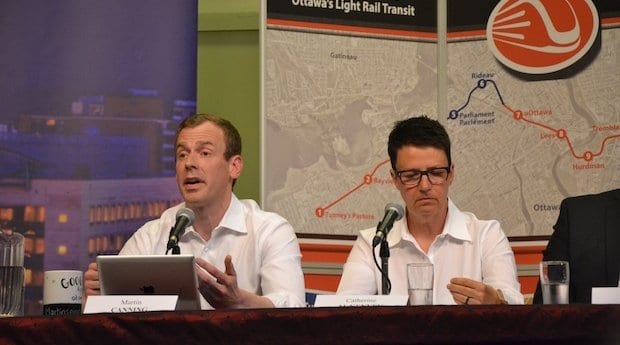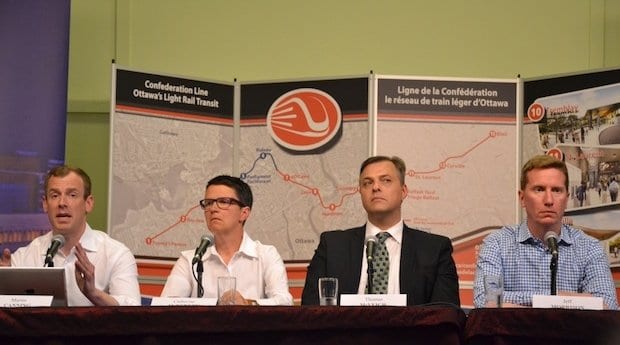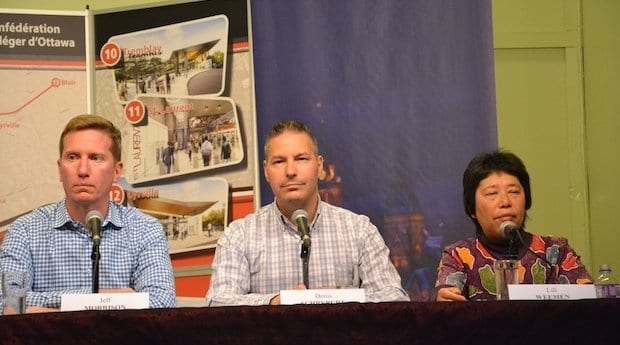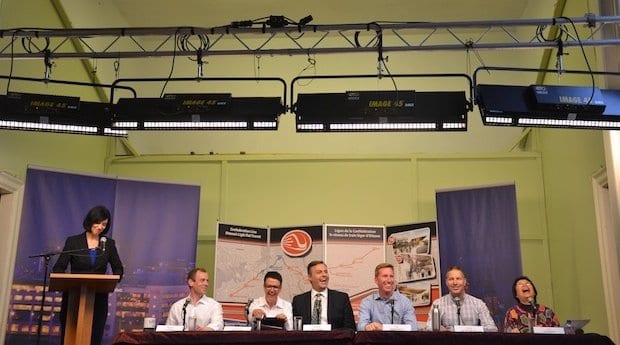
Martin Canning discusses infrastructure in Ottawa Centre. Credit: Julie Cruikshank

The candidates focused on the complete streets policy for Ottawa, which would see urban roadways developed with the needs of all users, including cyclists and pedestrians, in mind. Credit: Julie Cruikshank

Jeff Morrison, Denis Schyburt and Lili Weemen. Credit: Julie Cruikshank
Transportation was the order of the day at the first all-candidates debate for Somerset Ward. Candidates Jeff Morrison, Denis Schryburt, Thomas McVeigh, Catherine McKenney, Martin Canning and Lili Weemen gave their thoughts on the city’s LRT development, cycling infrastructure and revitalizing the downtown core at a well-attended June 16 event moderated by the Ottawa Citizen’s Joanne Chianello.
At the forefront of the discussion was the notion of complete streets — a transportation policy adopted by cities such as Toronto that focuses on smart growth in urban centres. The policy requires that streets be designed, operated and maintained with the access needs of all users, including cyclists, pedestrians and seniors, in mind.
The first question, put forth by Patricia Marsden-Dole of the Centretown Citizens Community Association’s (CCCA) seniors’ committee, was about on-street parking and access to public parking. With an aging population and more seniors living at home, care services are increasingly being delivered to the door, Marsden-Dole said.
She asked the candidates how they proposed to make public and on-street parking available so that service providers can better access the seniors they serve.
For Canning, demographics are the key to this issue. He said identifying the needs of high-density areas and prioritizing access in those areas is a good starting point. McKenney, meanwhile, said the focus should be on making sure new condo developments don’t attract a disproportionate number of car-dependent commuters, putting stress on an already tight downtown parking situation.
McVeigh, meanwhile, said an audit of existing parking strategies is needed to adequately assess downtown parking needs. He wants to see more dedicated loading zones and less commuter parking on streets. Morrison focused his response on a defence of city green space and also called for an end to the city’s cash-in-lieu parking program, which allows developers to pay cash rather than provide the city-required number of parking spaces for their buildings.
Schryburt pointed out that the LRT development will reduce the number of commuter cars on downtown streets, freeing up space for designated loading zones, while Weemen called for a depoliticization of the parking debate.
The second question of the evening, put forth by the CCCA’s Michel-Adrien Sheppard, focused on pedestrian safety. Sheppard asked how the candidates proposed to keep pedestrian structures such as sidewalks in good repair.
For McKenney, the issue is one of funding. There is not enough money in the city’s master plan, she said, to keep pedestrian infrastructure maintained. “Seventy-four percent of us walk from our homes in Centretown to our destination in the morning,” she said. “That alone means that we have to have more money put into pedestrian infrastructure.” Wide sidewalks, automatic signals and speed limits of 30 kilometres per hour in residential areas are all essential for pedestrian safety, McKenney said.
McVeigh also called for more city funding for pedestrian infrastructure, particularly for winter maintenance and post-winter repairs. Morrison called for wider sidewalks on Queen Street to account for the two new LRT stations being built there, as well as increased time on walk signals at intersections.
Schryburt said he wants to see wider and better-maintained sidewalks on Lisgar Street, with more benches for mobility-impaired citizens. Weemen called for better cooperation between developers and the city, as well as priority given to pedestrians at busy intersections on Laurier, Metcalfe and O’Connor streets.
The third question asked how candidates plan to improve cycling infrastructure in downtown Ottawa. Morrison said the city needs to do a better job of maintaining existing bike lanes. “I was biking on Somerset west of Bronson the other day, and you wouldn’t even know that there’s a bike lane there because it hasn’t been painted in I don’t know how many years,” he said. “It’s been completely worn off.”
He wants to see a dedicated bike lane on Albert Street and said there is a particular need for better marking at intersections and connection points.
McKenney, a year-round cyclist, again focused on finances, saying she would support a $70 million investment into cycling infrastructure and more segregated lanes. She also pointed out the ineffectiveness of “sharrows,” which she said do nothing to keep cyclists safe.
McVeigh said the city needs to focus on connecting bicycle lanes and pathways in the city to create a grid system, a strategy he said has worked well in Calgary. Schryburt reiterated the need for a grid system, as well as an effective north-south bike corridor and more lighting on bike lanes at nighttime.
Canning said the city needs to make more of an investment in cycling infrastructure, particularly more downtown bike racks for commuters to lock up their bicycles. Weemen again called for a depoliticization of the issue, saying that more NCC land should be devoted to recreational cycling.
The next question asked the candidates how they as urban councillors would work with their suburban and rural counterparts. “Usually, the best way to work with somebody is to work with their concerns,” McVeigh said. He said the key to getting suburban councillors to understand the issues facing downtown is for downtown councillors to familiarize themselves with suburban issues.
Morrison said that since many suburban residents are commuters, his focus would be on reiterating to the other councillors that good and safe transportation is in the best interests of all. Schryburt pointed out that 18 percent of the city’s property taxes are collected in Centretown and said he would take a hard-line approach to making sure that money stays downtown.
Weemen said that she believes the city’s 2001 amalgamation was the wrong move and that essential services, but not the accompanying politics, should have been merged. Canning, meanwhile, said that multi-partisan engagement is the key to bringing leaders together.
The next question asked what vision the candidates had for downtown once the buses come off the streets. Schryburt said he would like to see wider sidewalks and more cycling infrastructure, as well as a focus on complete streets with trees, benches and patios.
Weemen’s vision includes more outdoor markets and restaurant spaces; she proposed allowing the public to suggest initiatives for a more vibrant downtown. Canning said he is in support of the city’s first EcoDistrict, which includes the possibility of building internet into infrastructure.
McKenney again focused on complete streets, saying she would like to see the city invest $1 million per year into the policy. She also said that the LRT development provides an unprecedented opportunity for sustainable growth in the downtown core.
Morrison said he would like to see Slater, Albert and Queen streets reinvigorated, with a particular focus on downtown vibrancy and bike lanes on Albert and Slater.
The evening’s sixth question focused on the sidewalks on Elgin Street and how best to make them safer and more usable. The candidates all agreed that wider sidewalks are needed, with McVeigh calling for the creation of an Elgin Street BIA. McKenney proposed taking out one lane of parking to allow for a more pedestrian-friendly street, and Canning emphasized the importance of decisive action on safety concerns.
Morrison called for a compromise, saying the city has a responsibility to maintain its standards for sidewalk width while still allowing patios and other outdoor initiatives. He is proposing the periodic closing of streets, including Elgin, to allow for more pedestrian traffic.
Schryburt pointed out the economic gains to be had from widening and maintaining the sidewalks on Elgin, saying that increased foot traffic is good for businesses.
The final question of the evening, posed by Chianello, asked the candidates whether they support the city’s LRT development and what changes they would like to see. Morrison, Weemen and Schryburt all stressed the need for an airport link for tourists, business travellers and city residents. Canning expressed his concerns with keeping the system affordable for commuters.
McKenney reiterated her support for the 2,500 Buses a Day: No Way! Campaign, which opposes the city’s rerouting of Transitway buses down Albert and Scott streets during LRT construction. McVeigh called for improved connectivity within the city and stressed the importance of a strong cycling network to complement the public transit system.
Overall, the candidates were united in their support for complete streets, wider sidewalks and better cycling infrastructure. While McKenney focused on financial realities, Canning called for more community engagement on issues, and McVeigh emphasized the importance of small details as part of the larger city picture.
Schryburt advocated for a strong downtown that takes demographics into account, and Weemen maintained the importance of depoliticizing issues to arrive at long-term solutions. Morrison stressed the importance of maintaining green spaces while striking a balance on infrastructure issues.


 Why you can trust Xtra
Why you can trust Xtra


